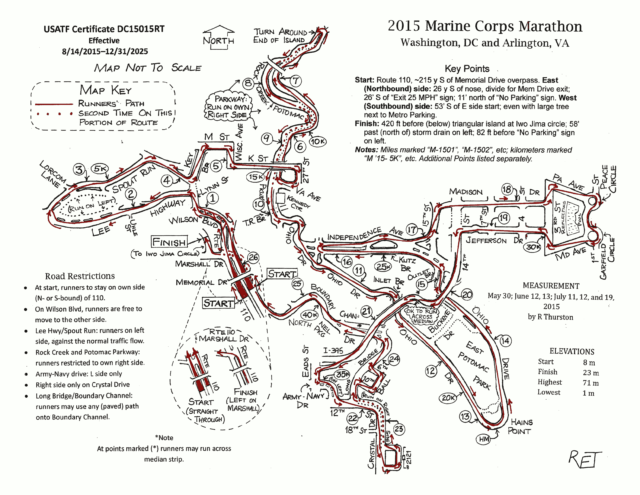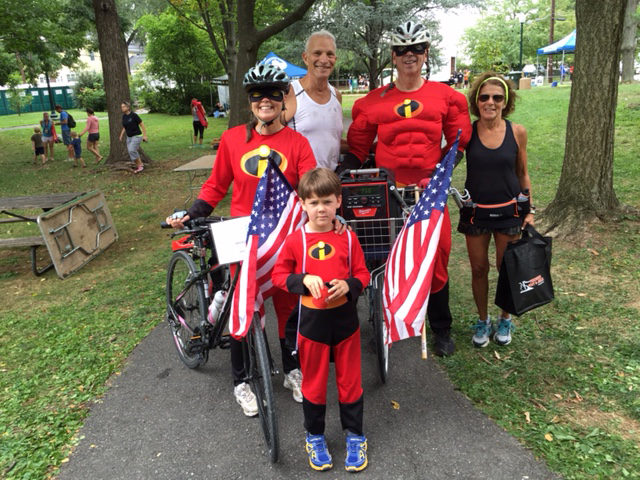All alone on the Marine Corps Marathon course, Kyle King had a lot of time to think. Even as he led Jon Mott by a minute in the 16th mile, he reflected on the extensive research he had done on his rival, specifically Mott’s recent 2:17 at the Berlin Marathon.
“I stalked him pretty hard before the race, and he ran some 5:05s in his last 10k at Berlin,” King said. “I started hurting early on, my calf started acting up in mile 12, so I knew I didn’t have a safe lead because he was gunning for me. I was running scared from 16 to 23.”
While Mott, 35, had raced five weeks prior, King, 33, had spent all summer and fall in the California desert, where he’s a captain stationed at the Marine Corps Air Ground Combat Center. Aside from his girlfriend accompanying him on a bike, he trained alone, but as he approached two 180 degree turns in miles eight and 17 on race day, he wanted to make sure he didn’t waste the chance to be seen.
“I needed to look like I felt fantastic,” King said. “If he knew how much I was hurting, I was in trouble. Some races, I feel like I’m floating until mile 18, but I was working really early on today. I wanted to exude confidence and strength.”
His 2:19:19 was the second-fastest finish in 25 years, three seconds behind a tie for the 10th fastest in the race’s 47-year history. Mott was roughly 3.5 minutes behind in 2:22:46.
King took the lead from the start, coming through two miles in just under 11 minutes.
“I didn’t want to go out any faster than 5:25s, but that was hard because I was excited to race, the weather was great and I was ready to go,” King said. “I thought he was going to cover my moves, but I guess he decided not to go with me.”
Mott is a Lakeland, Fla.-based coach and three-time Olympic Marathon Trials qualifier, and while he initially picked Marine Corps as a race he could try to win, the trip became as much about supporting the nearly two dozen of his athletes who were racing the marathon and 10k after he was invited to race Berlin in September.
“I ran the race that I thought would win it, but I had no idea what kind of fitness he was in,” Mott, 35, said. “I was playing defense, hoping he’d fade, but he never did. I thought I might be able to catch him, but by 20 miles I could tell he wasn’t coming back.
“It was the easiest marathon I’d ever run, but I couldn’t go any faster.”
While he took time off after Berlin to recover, Mott felt he was missing the 160-mile weeks that had carried him to that recent personal record.
King spent much of 2021 and early 2022 living in Alexandria while in officer training school at Quantico, and had planned to race the 2021 Marine Corps Marathon before the in-person race was canceled a month out. The disappointment led him to take drastic measures — running a 100k in Natural Bridge, Va.. He got a grip and focused on his road training, which led him to a win at the MCM Historic Half in May.
Fascinated by search and rescue, King initially planned to join the Coast Guard after graduate school, but found his skills weren’t in high demand. But the Marine Corps seemed like it would be a nice blend of amphibious operations, making for a challenging career. Several years later, the Good Boys Running Club in Denver reawakened his love for running.
He had planned to race Marine Corps in 2019, but was selected for the World Military Games, where he ran 2:16:56 for eighth place. He was the 2020 Marine Athlete of the Year after his 47th place finish in the 2020 Olympic Marathon Trials. Mott, coincidentally, was 47th in the 2016 Trials.
The King sought in the Marine Corps came into play during his run up to the marathon. A weeklong training exercise in the desert left him only nighttime to try to fit in any running, and an encounter with a rattlesnake put an end to that. After that, a trip to Big Bear Lake in California for a long run at altitude became a four-hour fiasco when the fire roads he planned on were closed, a detour took him through zealously-guarded private property and the way out means crossing rocks that threatened to wreck his ankle. It wasn’t the smoothest buildup, but he couldn’t argue with the outcome.
Experience breeds improvement for women’s winner Baker
The last time Chelsea Baker ran Marine Corps, it might as well have been half a lifetime ago. In a sense, it was.
Her 2019 effort, ending up in a 59th place in 3:22:48, run in a downpour that transitioned to a steam bath, was just three years into her running career, which stared when she joined the British Royal Navy.
“I wasn’t really athletic before I joined the military, but I got pulled into cross country,” Baker, 32, said. “This was my second marathon when I ran it in 2019.”
In the intervening years, the dearth of major competitions gave Baker time to develop as a runner, and by the time she got back to Arlington for the 2022 Marine Corps Marathon, she was confident and like King, fed off of that confidence to carry her to victory in 2:42:38, the ninth fastest time in a race history that has seen more churn than the men’s, with five other top-11 times run in the last 25 years.
Not that she knew she was winning from listening to the crowds.
“They must have gotten confused with the 50k, because people kept telling me I was in fourth or third,” Baker said. “I just tried to drown them out and focus on my own race. To come back and win this has been mind-blowing.”
The 50k started 40 minutes before the marathon, and women’s winner Melissa Tanner ran just fast enough that she finished 23 seconds ahead of Baker, too close for the finish line crew to stretch out the finishing banner again for Baker. While most runners want to make sure they have enough left in the tank to finish strong, particularly on an uphill final stretch like Marine Corps, Baker got to prove it when she went back and crossed the finish line again for her photo op.
She had some input into her race plan from her boyfriend Adam Stokes, who was the 2019 runner up.
“I knew I didn’t want to go out too fast, so I stuck to that plan and didn’t start hurting until mile 23. I absolutely loved it,” she said. “I might have run faster if I had someone on my shoulder pushing me.”
Now a Royal Navy team elder, it fell to Baker to stress the restraint her coach had preached, and she followed to success.
“It’s hard not to get caught up in the atmosphere,” she said.
Fun for the whole family
Ryan Udvadia’s work as an accountant stresses details, but there was one he forgot in the lead up to the Marine Corps Marathon — changing his wife’s last name on her registration after the Clifton Park, N.Y couple’s June wedding. Cara Udvadia, 25, will go in the record books as Cara Sherman, but her time — 2:47:08 for second among women, is just as sweet.
“After I graduated from college, I felt a little lost, not having a team with goals to work toward,” she said. “It was definitely an adjustment, but once my dad started coaching me, I felt like I was on the right track again.”
Now a few years into her career as a hydrological engineer for the U.S. Geological Survey and out of the pandemic, she’s back to the level of consistency she missed from college.
She started the race relaxed but found runners to keep her company from mile eight to 18.
“I felt smooth until mile 24.5,” she said. “If another woman would have caught up with me, I’m not sure I could have responded. But I see how people get addicted to this.”
The Udvadias, both University of Albany alumni, chose the race because of Ryan’s connection to it. In 2019, he made good on years’ worth of threats to run his first marathon with his grandfather, Frank Capone.
“When he was little, he used to call me an tell me he ran around the block,” Capone said. “Then he went on to run in high school and then college, but he would always tell me ‘Grandpa, you got me into running. I’m going to run my first marathon with you.’ I tell him I’m too slow, but he doesn’t care.”
The pair ran 4:52:18 in 2019, mostly in the rain, and Ryan realized he bit off more than he’d bargained for.
“It was so cold, it rained so much, but I’ll never forget running with my grandpa,” he said.
His 2:27:36 debut for a competitive effort was enough for hm to need a few days to commit to another, but his response to the crowds was undeniable.
“It hurt, but the crowds made all the difference,” he said. “Even when I was slowing down after 19 miles, every time I passed water stop, I’d speed right up. The energy from the cheers is real.”
Moving up
Bonnie Keating, 37, a Robinson Secondary School alumna, returned for another crack at Marine Corps after finishing fifth in 2019. A transplant to San Diego, where she is a strength and conditioning coach, she felt the temperature drop from California and spent most of the race trying to warm up.
“It wasn’t by design, I just couldn’t get myself going,” she said. “I just felt off, but it wasn’t all bad.”
She ran 2:47:47 for third, though she thought she was in fourth after she passed a woman in the last few miles.
“I had good miles here and there, but they didn’t stay consistent until after 18,” she said. “When they gave me a pass for the awards when I finished, I thought there had to be a mistake.”
Like Baker, she improved on her 2019 time, when she ran 2:55:03.
The 50k returned for its second running, with Davidson, N.C.’s Chris Raulli, 34, running 3:05:45 and Baltimore’s Tanner, 41 running 3:22:15.
Raulli ran his first sub-2:30 marathon, with hopes for a sub-3:00 50k, but his last five miles suffered.
Tanner finished third overall in her first Marine Corps race since the 2008 marathon, where she fell apart in Crystal City and was mindful not to do so again.
The winners in 2019, Arlington’s Mike Wardian, 48, (3:18:27) and Rockville’s Liz Ozeki, 34, (3:33:05) both finished second. Wardian felt like his potential finishing time was wide open, given his lower training volume since finishing a coast-to-coast run this summer. Ozeki was pleased to improve on last-year’s time, particularly after she hadn’t committed to the race until two months prior, her eyes on marathons and halves this fall. Dale City’s Jonathan Ladson, 31, (3:24:50) and Hagerstown’s Lauren Cramer, 38, (3:49:43) finished third, with Ladson holding second place until the final miles.
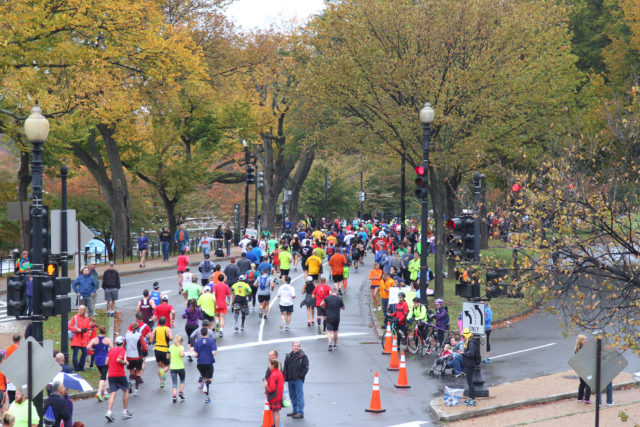
Running the Straight and Narrow
As I write this, Marine Corps Marathon training is reaching its zenith. The calendar holds just a few more weeks for hard training.
And by the time you read this, you’ll be tapering. It could even be race week, your thoughts shifting to smaller details.
It used to be about how far and fast you’d run on Sunday. Now it’s about little things on race day like how to hold your gels and what shoes to wear. It’s about the defining question of the 41st People’s Marathon: Uber or Lyft?
How the course got this way
But I’m still hung up on a detail from last year, a detail that, when the howitzer fired, was as far away from my mind as the finish line: tangents.
It’s a post-GPS watch realization for me — and my run last year at MCM proved it — that I do a very poor job minimizing the distance I cover on the course.
In other words I’m realizing how important it is to study more than where the hills are and where they aren’t. After all the time invested in training, I should also be studying the turns and curves, amassing the knowledge — or at least the awareness — of how to only run 26.2 miles.
Rick Nealis made some choices on the fly while running the Marine Corps Marathon in 2020.
Since the COVID-19 pandemic forced the race he has directed since 1993 to go virtual, he crafted his own course, though without his usual authority to close down roads he was accustomed to. He meandered the W&OD and Mount Vernon trails in Northern Virginia to get his 26.2 miles. With a course change after a mental remapping, a detour into Alexandria and a stop for refreshments in Old Town, he took what the day threw at him. It fit the perspective that has helped make his race a pillar of the American running community.
“I’ve basically taken a Semper Gumby approach,” he said. “I try to be very flexible, and that’s a trait that you need as a race director. You can’t be afraid of change, because the best plan pretty much goes out the window when you start up, because once everything is in motion, things change.”
After nearly 30 years of that welcomed uncertainty, Nealis is going to have a slightly more predictable lifestyle. He’ll retire in January at age 69 from what has grown under his watch to be a series of successful races, including more than a dozen races over the years in addition to the annual marathon. The current event series includes several trail races, a half marathon, a turkey trot, and a 17.75k that commemorates the Marine Corps’ founding. He also added a 10k and 50k to the marathon weekend.
“The soul of the Marine Corps Marathon is Rick Nealis,” said George Banker, the race’s longtime historian and participant since 1983. “It hasn’t moved off the mark since he’s been in charge — he’s moved the quality forward, moved people’s confidence in the event forward. The way he leads that team shows up in all of the Marine Corps’ races.
“It’s more than a race, it’s an event, and he’s made it that way.”
A Marine supply officer in the early ’90s with a 3:09 marathon best from an MCM nearly 10 years prior, Nealis initially thought of his assignment to the race as a demotion, even though he was an avid runner.
“I went from having about 180 Marines and civilians working for me down to three officers and 12 enlisteds,” he said. “It didn’t take long for me to realize the opportunities this race presented.”
Though it’s the centerpiece of the Washington, D.C. area running scene, drawing a national field and boasting what a Towson University study found to be an $88 million regional economic impact in 2013, the marathon serves as a logistical assignment for the corps.
“It’s a chance to introduce the Marine Corps to people on a personal level. For a lot of the public, Hollywood tells the stories of Marines and there’s often a lot of dramatic license, but it’s different to show thousands of people what they can do when they work together to put on an event like this and contribute something to the community.”
When the traditional two-year rotation would have moved him out, the Marine Corps decided to keep Nealis on permanently as a civilian race director in 1995.
Nealis credits fellow race directors with ideas that seeped into the Marine Corps series, but Chicago Marathon Race Director Carey Pinkowski said Nealis ensures that it’s a two-way street.
“Rick is incredibly generous with his time and experience,” Pinkowski said. “He always makes himself available to help out a fellow race director, whether it’s a world major or a 150 person road race.”
Pinkowski described him as a living resource of the best practices in the road racing industry, and noted his adaptability and eagerness to adopt new ideas.
“He’s always looking toward making things better, trying to improve the runner experience and make everyone involved feel special,” he said.
Two years into Nealis’ tenure, Oprah Winfrey’s successful race at Marine Corps in 1994 opened the door for him to work on the torch relay for the 1996 Olympics. While he learned a lot about logistics, he truly soaked up the opportunities that sponsorships would create for the marathon and followed through aggressively
“These days, if you don’t have the support from sponsors, you really can’t afford to do the race the right way,” Nealis said. “When you look at the basic measures like closing down roads or having the supplies to keep the runners safe and healthy, it’s hard to think about how we did things in the early ’90s.”
“A lot of people wouldn’t be able to stand in his shoes the way he has for so long,” Banker said. “Not only does he have to deal with the needs of the runners, it’s a military event, and I think there’s been more than one time the Marine Corps commandant has asked whether this is the best use of the Marines’ time and effort. Every time, Rick has shown that the answer is ‘yes.'”
“I’ve had a lot of receptive bosses over the years,” Nealis said. “To their credit, I’ve never had any idea dismissed out of hand, and sometimes some of the crazier ideas, like running an urban 50K, turn out to work pretty well.”
The last two years, with COVID-driven cancelations, have worn on Nealis, particularly having to cancel the 2021 in-person race a month before the race. The 2022 race, scheduled for Oct. 30, is set to go off with some additional measures that will be announced in mid-September.
“I hated having to pull the rug out from under people,” he said. “That one really hurt. I knew that if I didn’t have a live event for my last race, it would probably eat at me until my dying day. There’s something about being on that start line, hearing the howitzer go off and seeing those 20,000 marathoners head out. Even when you’re soaking wet on the finish line and all of a sudden the sun’s out and you’re sweating and suddenly the Secret Service wants to get the vice president in to watch his son finish, there’s nowhere I’d rather be.”
The end of his tenure as MCM race director mirrored the closing miles of his 2020 virtual marathon. Long past when his water bottle emptied, Nealis headed back toward his car and, on a whim, approached the water fountain at Lady Bird Johnson Park.
“I figured if there was any water running, it was probably going to drip out of the nozzle and I’d probably get COVID putting my mouth on it to get any,” he said.
Instead, he pressed the button, and what was seemingly the only working water fountain that day in the D.C. area shot like a geyser. He finished on a high note.
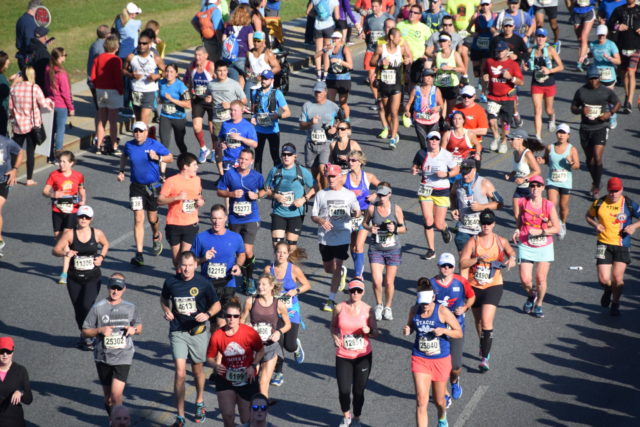
For some runners, it’s a first marathon. Others treat it as a homecoming of sorts. There were 20,303 different stories that involved crossing the finish line of the 2017 Marine Corps Marathon.
Antonio Osadalosada, 57, from Sacramento, Calif. was one of those runners.
This was Osadalosada’s second time running the Marine Corps Marathon. He also ran the year before. His goal this year was to improve on his MCM time from last year, which he did by six minutes.
“It was a perfect running day in my opinion,” he said with a smile across his face.
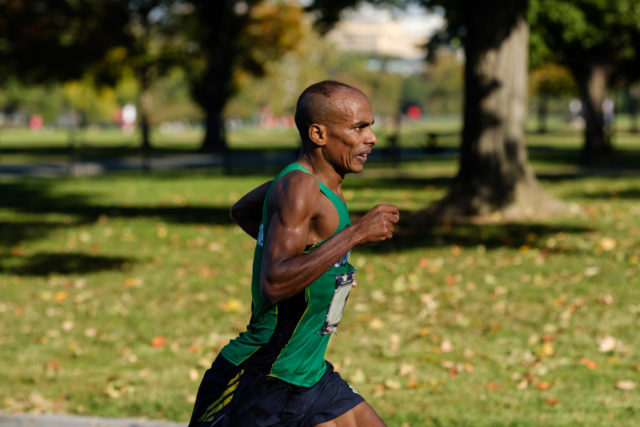
Confusion in the first mile threw much of the leading Marine Corps Marathon pack into chaos, but Arlington’s Desta Morkama eventually overcame a nearly-two-minute deficit, and up to an extra half mile, to win in 2:25:14. Meanwhile, Fairfax’s Sarah Bishop turned a 22-mile training run into a near-Olympic Trials qualifying time (2:45:06).
This all followed a 10-minute delay to allow a suspicious package to be cleared from the course. Read More
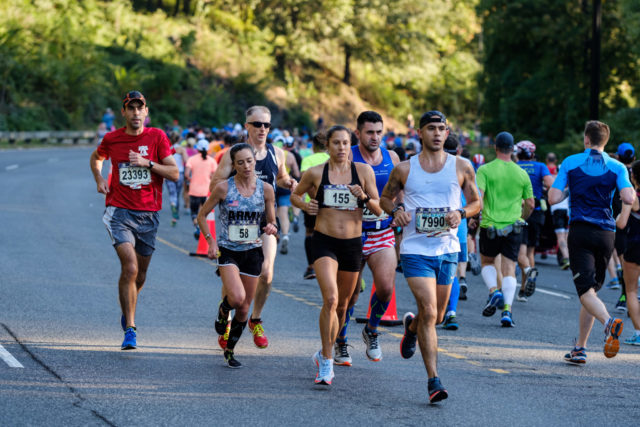
Successful marathon racing means being able to handle and adjust to 26.2 miles of uncertainty. Usually that means digging down when things get tough, like when you go the wrong way in a race, but for Fairfax’s Sarah Bishop, the Marine Corps Marathon meant feeling better than expected and going with it.
She took what was primarily a 22-mile training run for her goal race in December and won, set a personal record by more than two minutes and fell just short of the target she’s setting for five weeks from now. Her 2:45:06 was just seven seconds short of the qualifying standard.
Bishop, 35, is not too bummed, though. She was happy to even be there.
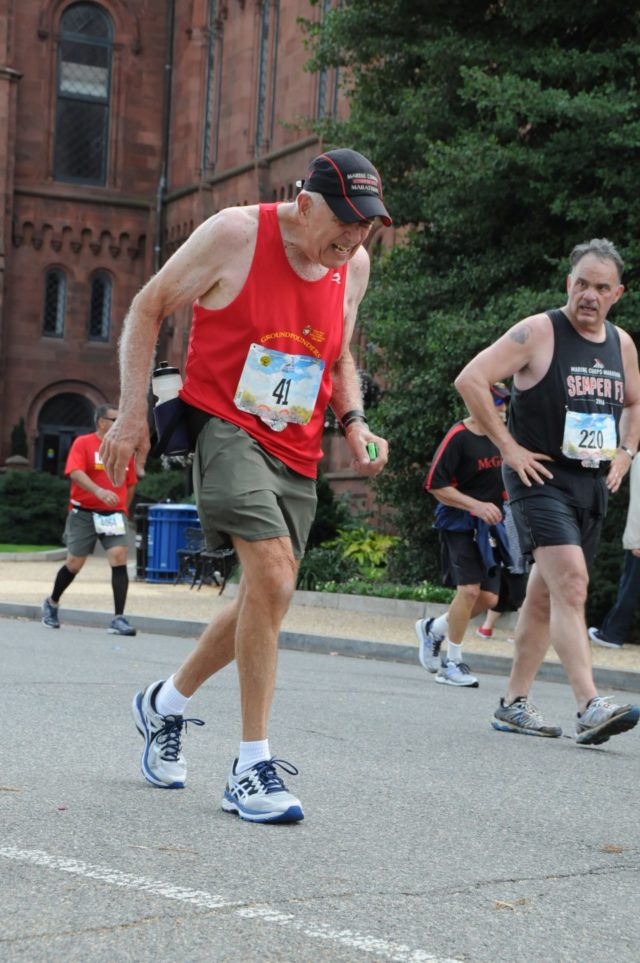
Update: Richmond retired from running the Marine Corps Marathon before the 43rd race, set for Oct. 28, 2018.
Elisa Zwanenburg is in awe of her father, as he nears 80 years old.
“He’s very determined,” she said. “He’s very competitive. It may be the Marine in him.”
Determined is one way to describe it. For over 40 years, Alfred “Al” Richmond has laced up his running shoes and competed in every Marine Corps Marathon in Northern Virginia. He is now the last “Groundpounder” to have completed every race.
“Honestly, I just didn’t want to be the next one that dropped out,” he joked. “It kind of ended up being a rite of fall.”
Richmond doesn’t gloat, nor does he relish in this distinction. It doesn’t seem ingrained in his identity, it’s just fact: He’s the last of the elite group.
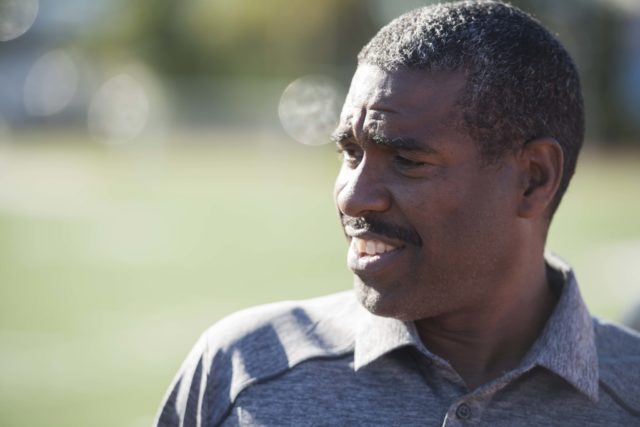
The Working Man
Darrell General is used to operating on a tight schedule. Thirty years ago, when he qualified for his first of five U.S. Olympic marathon trials at the Marine Corps Marathon, General was training hard and working harder at multiple jobs. Today, General, 51, is right on time for a 4 p.m. interview for the Pace the Nation podcast. As long as we get this done in 45 minutes, he’ll still have enough time to drive over to George Marshall High School in Falls Church, Va. to set up a cross country course for tonight’s pre-season time trial. General has been head coach there since 2002.
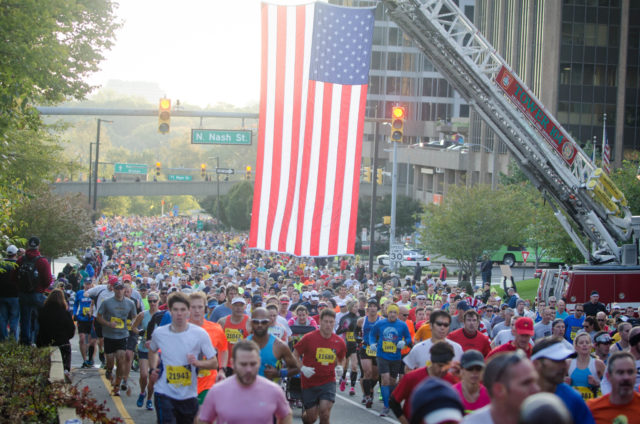
Marine Corps Marathon
Oct. 22, 2017
Arlington, Va. and Washington, D.C.
7:45 Handcycle start
7:55 Runners start
Helpful stuff
● Do yourself a favor: run the tangents
● Runner tracking, messaging, race app
● Spectator guide
Features
● D.C.’s running superfan
● Hand-cycle racing
● George Banker
● Shutdown Palace
● Support from spectators
● The MCM course
Race coverage
● 2016 women’s winners
● 2016 men’s winners
● 2016 midpack
● 2015 winners
● 2015 midpack
● 2014 winners
● 2014 midpack
● 2013 women’s winners
● 2013 men’s winners
● 2013 midpack
The 42st Marine Corps Marathon will bring tens of thousands of runners and spectators to D.C., Arlington and the National Harbor. The extra miles around the Pentagon parking lots and Crystal City are gone and runners will get two more miles on scenic Rock Creek Parkway. Whether they’re gunning for the win, hoping for a personal record or just trying to cross the finish line, they’ll be making memories along the way.
What’s happening:
The Metro will once again open at 6 a.m., allowing the course to go back to its 2013-2015 configuration.
Race smarter: run the tangents
Cut possible minutes off of your time by running as close to 26.2 miles as possible. Senior Editor Dickson Mercer takes you through how you can approach the race as strategically as possible.
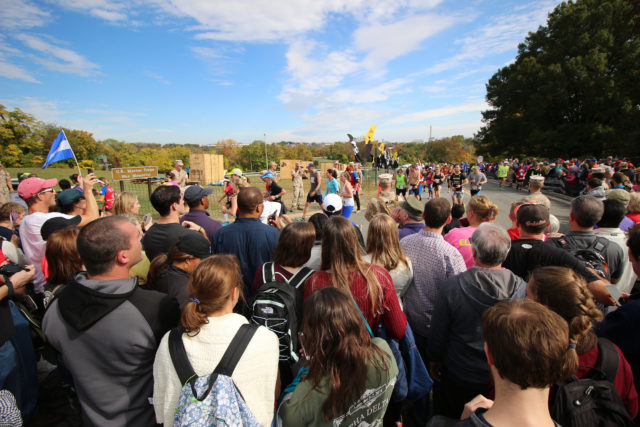
Marine Corps Marathon Spectator’s Guide
We asked local runners and their friends for their best advice to making the most out of that morning. Use this guide while developing your plan for the day to best support your runner and make the most of your morning!
Look for D.C. running’s superfan
Somewhere along the course, you’ll hear music. Then you’ll see a character from the movie The Incredibles. And then you’ll understand the enthusiasm Paul Silberman brings to local road races.
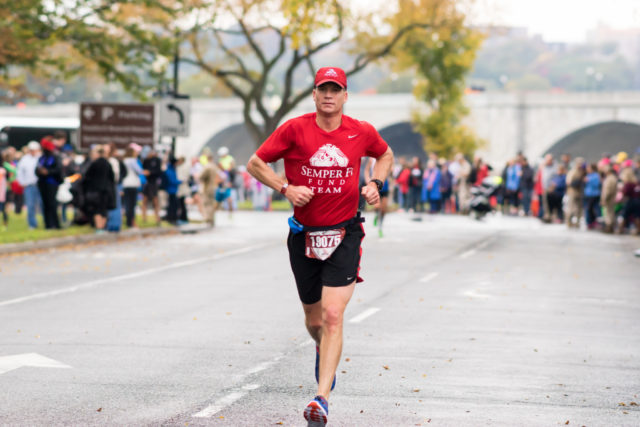
Running gave Alex Hetherington an identity beyond being a Marine
“It gave me an identity beyond being a Marine,” he said. “You think being a Marine is an identity in and of itself, but you’re in a squadron with a bunch of other pilots who are just like you. That’s who you work with day in and day out, and running was sort of a way to be a little bit different. It was my persona.”
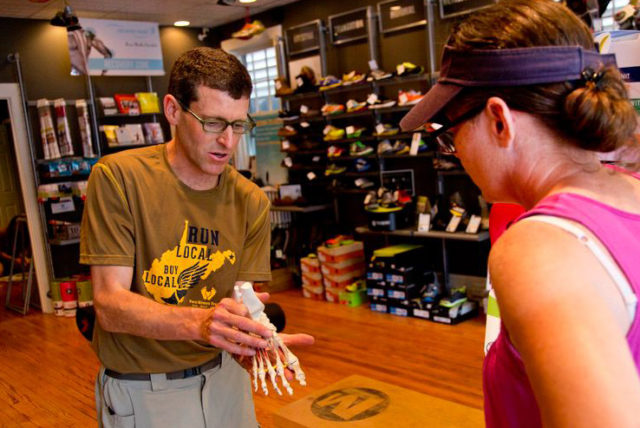
Mark Cucuzzella wants a solid foundation for military service members
Mark Cucuzzella’s highest hopes for running don’t involve him breaking the tape at a marathon. Or posting amazing sales figures at his West Virginia running store, Two Rivers Treads. He wants every military service member to be able to run injury-free.
A look back: Marine Corps Marathon 2015
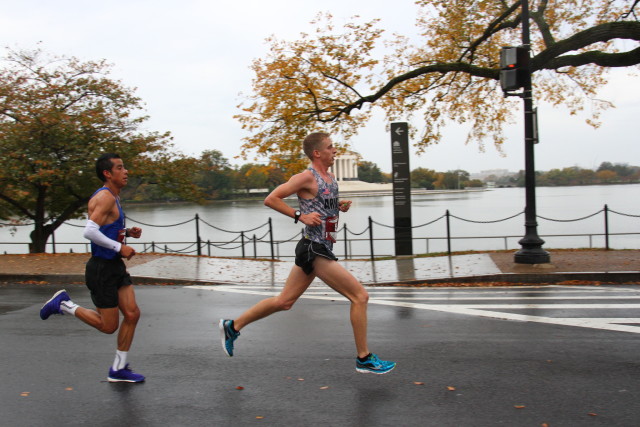
Lafontaine, Mendez Suanca win see-saw MCM battles
Trevor Lafontaine had never raced longer than a 10k when he took the line at the 40th Marine Corps Marathon. A little more than two hours and 24 minutes later, he had won.
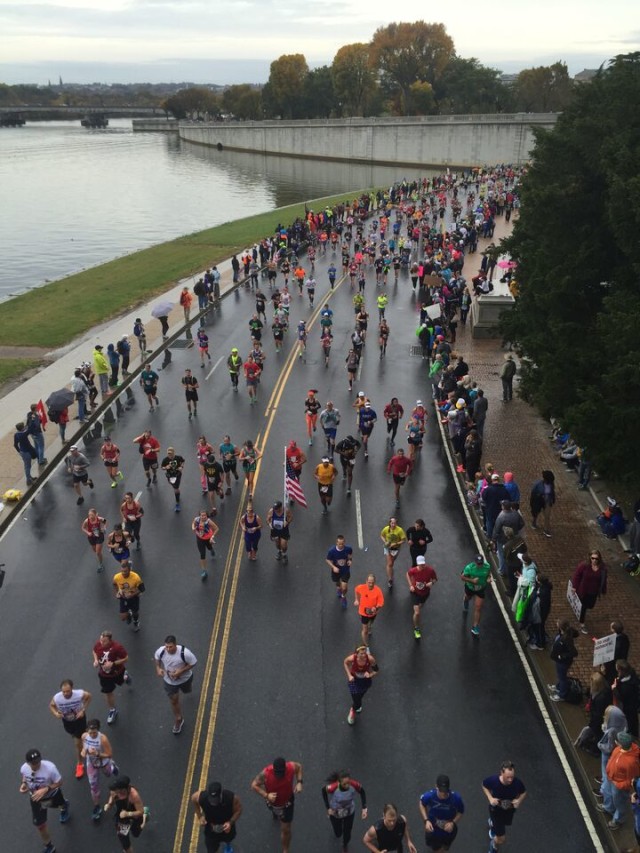
Sunday’s 40th Marine Corps Marathon started out on the wrong foot when rain and unusually long, slow security lines frustrated thousands of runners, but fortunately, it’s not how you start a marathon, it’s how you finish.
Luckily, it’s how you finish

Joe Did It!
Joe Divel took the enthusiasm that guided his training with him on marathon day.

Will Etti Cuts Down His Time
Will Etti completed the Marine Corps Marathon in 5 hours and 14 minutes, a 37 minute PR over last year’s effort. In last year’s Marine Corps Marathon effort, Etti hobbled through cramping through the later stages of the race, an experience that has been at the forefront of his mind since he began training for this year’s redemption six months ago.
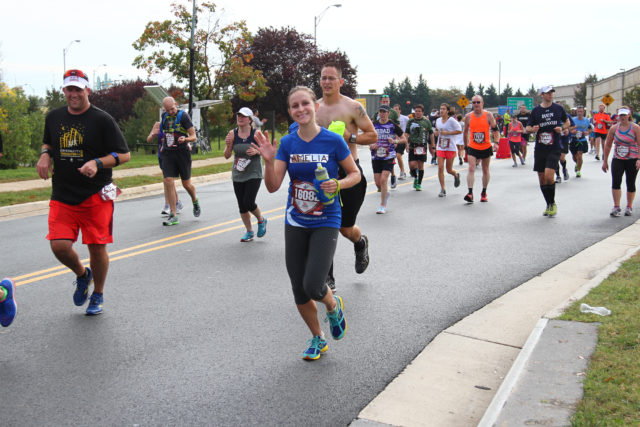
The Freewheelin’ Amelia McKeithen
Amelia McKeithen didn’t go in for a rigid training plan that told her what days to run, when to cross-train, or what to eat. She knew back in March when she committed to running the Marine Corps Marathon as a fundraiser for The Children’s Inn at NIH that a structure like that would cramp her style.
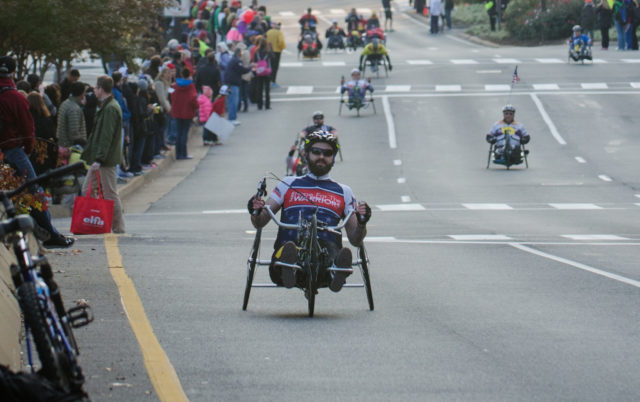
D.C. races: a handcycle mecca
Push-rim wheelchair racers and handcyclists are familiar on the courses of D.C.-area races, but that’s not the case elsewhere in the country.
2014
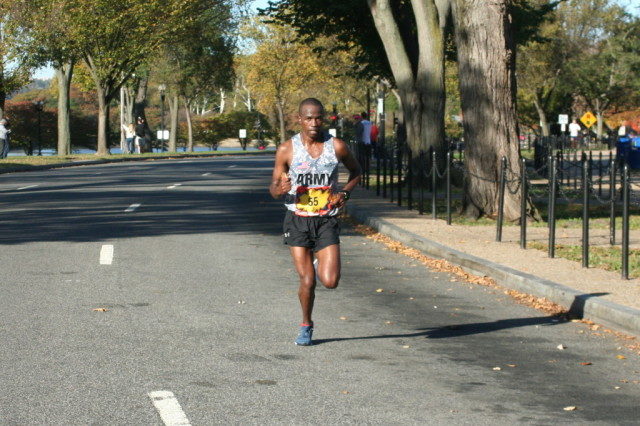
Marine Corps Marathon winners make moves on the Mall
Amid the museums that line the National Mall, Spc. Samuel Kosgei and Capt. Meghan Curran carved out their place in history when they both took leads in the Marine Corps Marathon that they would hold to the finish. Along the way, they both led their respective U.S. Army teams to military marathon team championships.
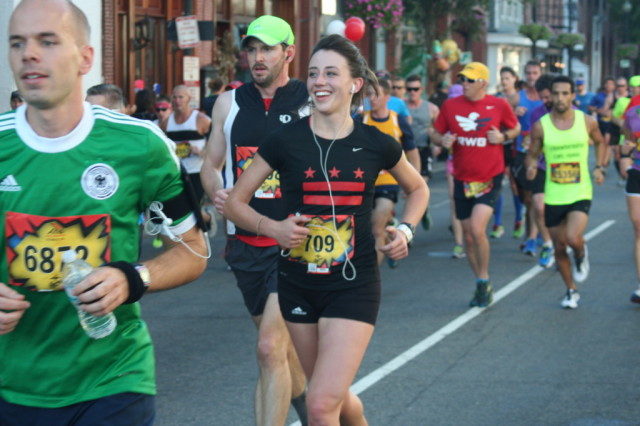
Volunteers make the day for Marine Corps Marathon runners
While many loved the scenic course, crowd support, and near perfect weather, runners at Sunday’s Marine Corps Marathon universally raved about one thing: Marine volunteers who motivated them to cross the finish line.
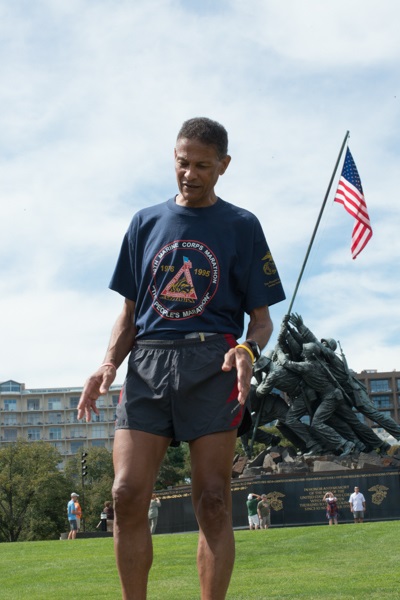
George Banker and his Marine Corps Marathon resume
To pin a label on George Banker, you’d have to get him to slow down first. He’s a runner, an organizer, a historian, a photographer, a speaker, a joker, a mentor, a problem solver, and whatever else anyone needs him to be.
2013
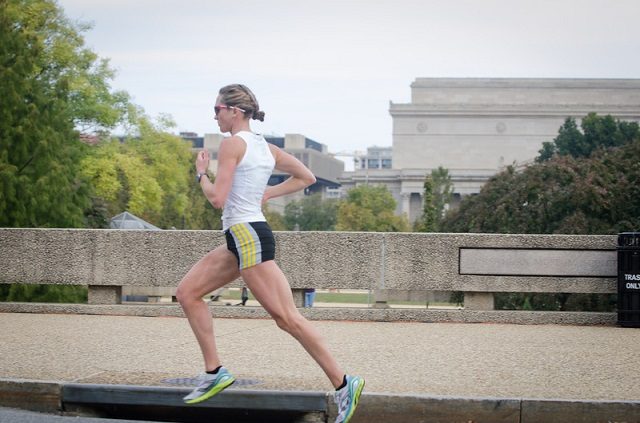
Calway notches MCM title, Olympic Trials qualifier
With a strong lead in the Marine Corps Marathon, Army Capt. Kelly Calway had her opportunity–run harder now or spend seven months regretting it. With an impending deployment to Kuwait waiting for her a week later, the cool day in Washington was her chance to take care of qualifying for the U.S. Olympic Trials.

Men’s MCM winner holds lead for more than 25 miles
Wire-to-wire. It almost has no place in any talk about a marathon, maybe only in a tall tale. The race is too long, too grueling, too open to disruption. But Girma Bedada did it at the Marine Corps Marathon, running 2:21:31.
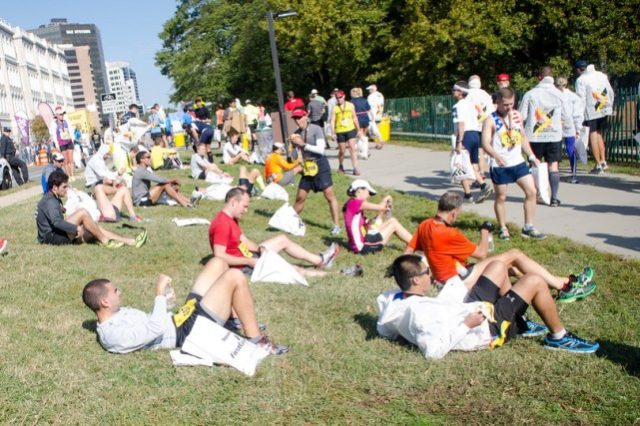
Marine Corps midpackers find a lot to like
Much like Girma Bedada and Kelly Calway‘s efforts, Mike Kunzer‘s race at the Marine Corps Marathon was the culmination of years of preparation and training.
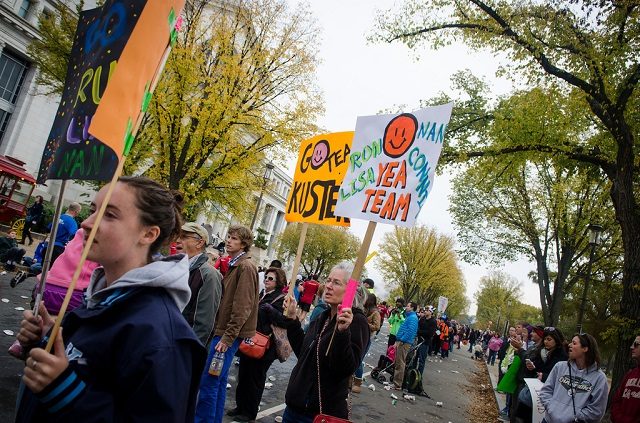
Marine Corps Marathon spectators prove running is a team sport
They hold their signs proudly while their eyes scan the road. It’s not easy: being in the right place at the right time. All the while they wonder: Do I have their pace right in my head? Did I miss them?
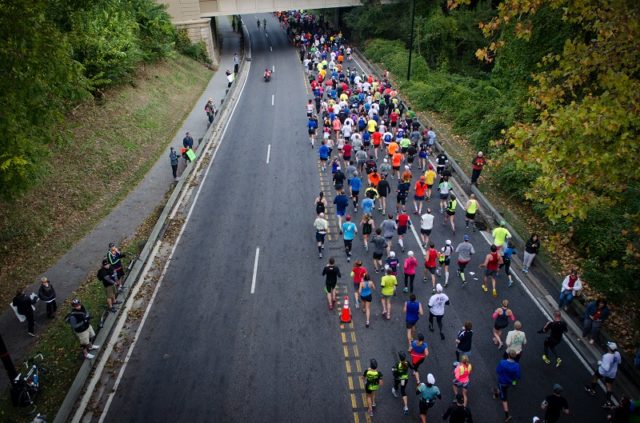
Shutdown Palace: When the Congressional budget impasse nearly ruined a marathon
Runners run, elected officials legislate and besides the dozens of honorary congressional chairman for the Cherry Blossom Ten Mile, never the twain shall meet. Until October 2013. The first federal government shutdown in 17 years threw the running community into uncertainty as runners were ostensibly banned from National Parks Service property and race permits for that land disintegrated, putting the region’s marquee race in doubt.

He was beating the bridge, and everyone else, when Trevor Lafontaine wondered if he had made his move too soon.
He hadn’t, but he had good cause to wonder.
[button-red url=”http://www.marinemarathon.com/Results/MCM_Results.htm” target=”_self” position=”left”] Results [/button-red]The 22-year-old West Point graduate held his lead on Oscar Santos, who he dropped in mile 19, and kept going to a 2:24:24 finish to win the Marine Corps Marathon, which celebrated its 40th anniversary. But he didn’t know what was coming up.
“I’ve never run more than 22 miles, so everything after that was uncharted territory,” he said.
LaFontaine hadn’t raced any distances longer than 10k, an occupational hazard when you come out of college and move right to the marathon.
“I think the little break after the collegiate season helped me,” LaFontaine said. “I ran about 30 miles a week this summer working 5 a.m. to 10 p.m., but things settled down once the school year started, so I had a little break after three seasons of running. Now I can set my own schedule, so when I want to train, I train.”
He coaches the U.S. Military Academy’s prep school cross country team in New York, which gave him flexibility schedule his training, but that hasn’t been entirely smooth sailing. He hoped to run the Army Ten-Miler to give him a taste of longer distances, but coaching the team meant spending that weekend on a trip to a cross country race.
Army coach Lt. Col. Liam Collins recruited him to run the race, but Lafontaine is largely self-coached.
“I did most of my marathon pace workouts at 5:30 pace, shooting for 2:25, so I’m really happy how it all turned out,” he said. “That’s really what I was shooting for. I’d throw in seven miles at marathon pace, but I never really went farther than that.”
That was all he needed, because he averaged just that to win by 1:43 over Santos.
He broke off from Santos, a contractor for the Mexican military, in mile 19, near the U.S. Capitol
Justin Turner and Ken Foster took the lead early, before crossing the Key Bridge at mile four, before falling back on Hains Point after the half marathon mark.
“I had a cramp in mile 18 and I stopped to massage my hamstring,” Santos said through an interpreter. “I lost about two minutes, and I never made up for it.”
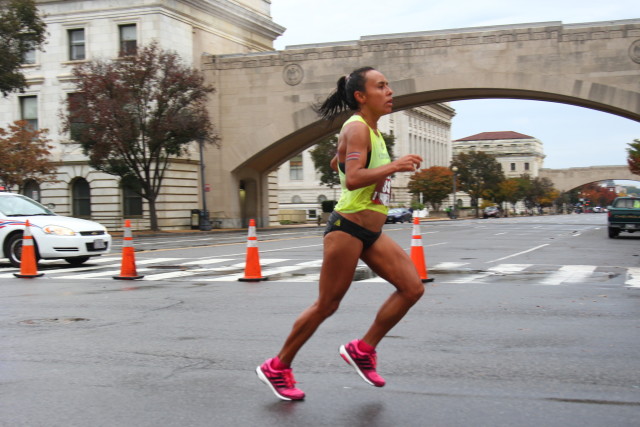
The women’s race also featured several lead changes, but in a rarity, the early leader prevailed. Jenny Mendez Suanca led early, but fell back around halfway through, when Harriott Kelly and Maria Elena Jimenez took over heading onto the National Mall near mile 18.
“They sped up and slowed down, but I just kept steady,” at 6:19 pace, she said through an interpreter. “I got a lot of energy from the crowd, even though I didn’t know all they were saying.”
Suanca started running seven years ago, encouraged by her husband, who coaches her, and won three out of her four marathons in her native Costa Rica before tackling her first international marathon at Marine Corps. Her 2:45:55 finish was a 10-minute personal best.
“I feel privileged to be here, running with the Marines,” she said, “It was much less humid. I was cold at first, I struggled, but I warmed up.”
She has been running for roughly seven years, and motivates herself with the opportunity to improve every day.
“I came to challenge myself, to run as fast as I could,” she said.
Behind her, Christine Taranto, who is based in Monterey, Calif., charged out of the middle of the pack to claim second place and a six-minute-plus PR over her time from the Big Sur Marathon this April. As a member of the Marine team, she relished the chance to pass up runners from other branches to finish second.
“Every person, I just thought, this is another point. This is our home race, so I should race like it,” she said. “I hit my goal half marathon split and took it from there. I listened to what number the crowd told me I was, and I just kept moving up. I just ended up running a solid, steady time.”
Taranto’s teammate at West Allegheny High School near Pittsburgh, Lauren Shaffer, also ran, finishing in 3:22:56. The pair finished in the top five at the Pennsylvania state cross country meet’s small school division in 1999.
It was Taranto’s fourth shot at Marine Corps, her third on the current course configuration that has been in place since 2013. Starting that year, the course traded a loop around the Palisades neighborhood for an out-and-back to the north on Rock Creek Parkway to the bottom of Shoreham Drive. Lafontaine’s time was the slowest in the current design, Suanca’s was the second-fastest of three winning women’s times.
Like Taranto, Brian Flynn, of Rockingham County, Va., worked his way up through the race, finishing third in 2:26:26. He used the race as a chance to run 5:25 pace for the second half of the race to prepare him for the California International Marathon in early December. Like Lafontaine, he is a coach, in charge of the Bridgewater College cross country team.
His strategy of holding back early, though, ended up leaving him in the lurch in terms of people to run with. He passed plenty of people
“I had some people from miles two through four,” he said. “Otherwise, I was just passing people, on my own.”
Evan Fox (2:33:01) of Arlington, Dickson Mercer (2:34:45) of Washington and Tom Dichiara of Garrett Park, Md. were the top finishers for their respective states in the D.C. area, while Kara Waters (2:55:53, fourth overall) of Great Falls, Va.; Sarah Whitworth (3:01:06) of Washington and Patricia Soumoff (3:14:39) of Greenbelt, Md. led the local women.


